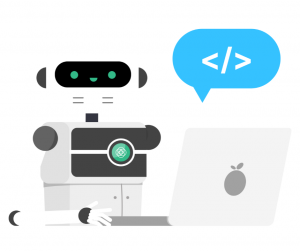There’s been big talk of AI in schools and universities during the past year, but I didn’t really, truly understand its impact.
Until now.
Until it got me.
As a writing teacher, I read a lot of papers, essays, stories, poems, journals — you name it, I read it. I’m conditioned to look for improvement from one week to the next and to coach both the struggling writer and the prolific. Seldom does an essay surprise me or leave me to wonder how I can help.
Until now.
Baseline Assignments
I begin every course with a basic opening assignment that provides an overall picture of the current skill level and aptitude of the writer — a baseline so to speak. I read and provide feedback on this baseline assignment and jot notes on a student card that I refer to each week so I can recall their particular needs and so forth. This system has worked very well for me over the past 11 years.
But this summer, I met…well, let’s call him Steve. Steve was 14-years-old and enrolled in my Essay I course to work on his descriptive and narrative skills. And on week 1, Steve’s baseline assignment blew me away.
His imagery was stunning, his vocabulary powerful: it was wonderfully unique and painted a vivid picture in my mind’s eye. It was just about perfect.
So, I did what I always did with really prefect writing right out of the gate on week 1. I ran it through a trusted plagiarism checker.
100% original.
Hmmm…
I still had a nagging suspicion in the back of my mind. So, I Googled “AI Detectors.” Several popped up.
I waited as the first results registered: No AI detected.
I tried another.
The second result: Unlikely AI use.
It seemed I had discovered a unicorn among my writing students. A perfect essay on week 1.
So, I set out to mentor this young prodigy and raised the bar from week to week to continually challenge and excite his innate ability.
Until today: week 4 of class.
A Unicorn?
Today I read Steve’s beautifully crafted essay all the way to the end — where it said “Regenerate Response“.
Hold the phone.
Regenerate Response? What’s that? Red flags blinded me.
I Googled the phrase.
The phrase ‘Regenerate Response’ is the label of a button in ChatGPT, an AI chatbot that generates text according to a user’s question/prompt.”
But I had checked. I had run Steve’s work through two AI detectors. I ran this latest essay again, this time through three websites claiming to flag ChatGPT writing. All three came back as “unlikely AI use“.
Furiously, I researched how to catch ChatGPT use. As it turns out, you can’t. Not reliably. Not consistently. AI detectors, it seems, are fraught with false negatives. There’s no way to be certain for sure that a piece of writing is the work of AI, except if your student, like Steve, copies and pastes more than they intended from the ChatGPT website.
Right to the horse’s mouth

Now I was left with the task of accusing a student and holding him accountable in a he-said, she-said situation. I didn’t even have an accurate baseline of his work from week 1 since he had been using AI the whole time. I decided to ask Steve about it. Just go right to the source.
“Hi Steve, are you using ChatGPT to write your work each week?”
He wrote back and his response shocked me.
“My bad…the reason I was using it was because there were some things i didn’t understand like the narrative and all that other stuff my apologies if I cheated.”
Two things flew to mind. First, if this sentence had been my original baseline, we could have avoided all the confusion from the start. And second, he just admitted using ChatGPT like it was no big deal. He even said if he was cheating as though this was up for debate.
Nonetheless, we cleared the slate and moved on to week 5…where Steve submitted another perfect and impressive essay. But this time I had a baseline of ability and recognized some of the word patterns and elevated vocabulary. More ChatGPT. Steve earned a zero.
It got me.
So, it got me. ChatGPT fooled me, and it prevented Steve from getting the help he really needed.
Nobody won.
What was learned?
While Steve seemingly learned nothing from the experience of being caught and failing the course, I learned that AI in the classroom (in person or virtual) is a real problem. It’s impossible to catch AI 100% of the time and it disrupts the collaborative bond a teacher and student should have.
While I haven’t decided how to prevent the use of AI in my online classroom, I have adopted a zero tolerance policy and now engage parents in the fight against cheating and ChatGPT use. As a teacher, I encourage parents to discuss the definition of cheating with their children and to read their child’s papers and assignments periodically to see if the words are his/her own. Parents know their child’s vocabulary and speech patterns and will spot a ChatGPT fake from a mile away.
So, though ChatGPT got me once, and very well might get me again, I’m now wiser and more savvy to AI shenanigans. But who knows what is next on the horizon.
